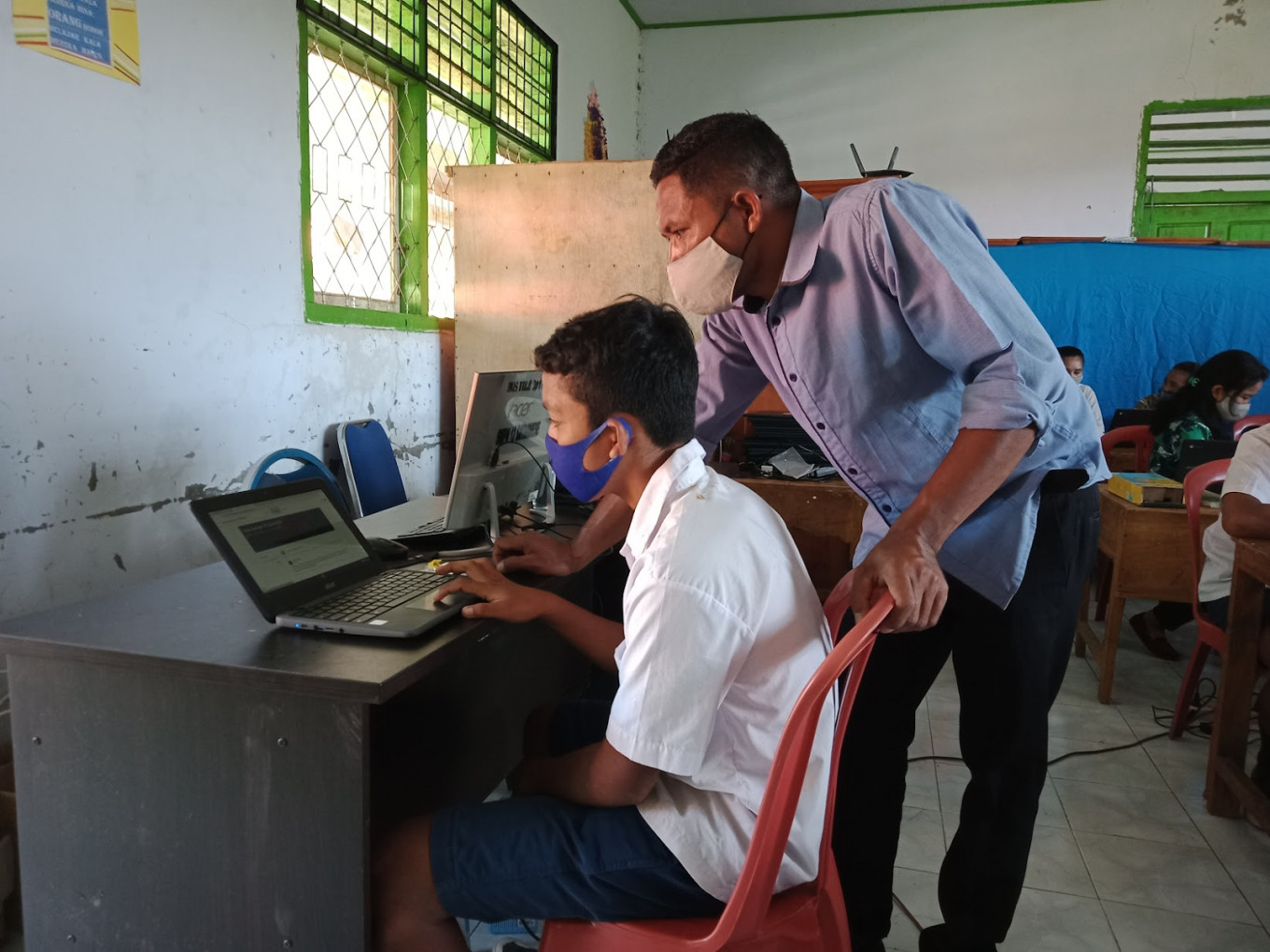Education modernization still faces major challenges
Nadiem’s education reform agenda faces speed bumps in 2021.
Change text size
Gift Premium Articles
to Anyone

T
he ambition of the education, culture, research and technology minister to enact comprehensive reforms in Indonesia’s education sector, including modernizing the national education system, has been well-documented, particularly after COVID-19 last year forced teachers and students to adapt to online learning.
But while the COVID-19 pandemic presented Nadiem with an opportunity to put online learning at the forefront of his educational reform agenda, the former CEO of tech giant Gojek instead opted to push for a return to in-class learning as soon as the COVID-19 situation was under control, citing fears of learning loss.
The policy dilemma over in-person vs. online learning was not the only challenge that Nadiem faced this year, as his flagship policy, the Merdeka Belajar program, was met with criticism from teachers and education observers.
Merdeka Belajar was one of Nadiem’s key educational reform policy initiatives after he assumed the Cabinet position in 2019, and was primarily aimed at reducing the administrative burden on teachers while giving them more freedom and responsibility in assessing students.
More recently, a ministerial regulation issued by the Education, Culture, Research and Technology Ministry that was designed to tackle sexual violence at higher education institutions also received pushback from Islamic groups.
Recurring online learning problems
As schools were forced to shut down after Indonesia detected its first COVID-19 case in March 2020, the government has been largely struggling to address longstanding obstacles to online learning, such as lack of access to the internet and devices as well as teachers’ digital illiteracy.
These ongoing problems have resulted in a national trend of cognitive learning loss. A World Bank study published in September revealed that students could experience between 0.9 and 1.2 years of learning loss during the 1.5-year school closure, which could cost each student US$408 (Rp 6 million) to $578 (Rp 8 million) in future annual earnings.
The struggle to adapt to online learning led to more students dropping out of school, according to observations by the Education and Teachers Association (P2G).
In response to these issues, Nadiem, along with Health Minister Budi Gunadi Sadikin, Home Minister Tito Karnavian and Religious Affairs Minister Yaqut Cholil Qoumas, signed a joint decree in March that ordered schools whose teachers, administrators and staff members were vaccinated to resume in-person learning, with the aim to fully reopen schools across the country in July.
The reopening plan, however, was dealt a major blow as the country was struggling with a second wave of COVID-19 that reached its peak in July.
Nadiem gave the green light for schools to reopen in August, after the pandemic was under control, despite lingering health concerns, arguing that there was “no other option” than in-class learning considering the threat of learning loss.
The move highlighted a significant step back for the minister, who had previously said the pandemic presented opportunities for educational reforms thanks to the acceleration of technology use.
Despite his push to resume in-class learning, Nadiem remained adamant that technology could be part of the solution to some of the country’s problems in the education sector, adding that the government was committed to expanding access to technology for students across the country.
“We have no other option but to adapt and innovate, turning disruption into solutions,” Nadiem recently said. “We are committed to not only expanding access to technology [for students], but also to bridge the knowledge and technological skills gap.”
But plans to return to classrooms are currently in major doubt as the highly contagious Omicron variant poses a concern for parents, teachers and students alike.
Merdeka Belajar misses its mark
Nadiem’s Merdeka Belajar program, which includes a series of policy initiatives to empower teachers and schools – dubbed sekolah penggerak and guru penggerak, has been poorly received by teachers.
“The program is a great idea [...] But in practice, it is poorly executed,” United Federation of Indonesian Teachers (FSGI) secretary-general Heru Purnomo recently told The Jakarta Post.
Part of the problem, according to Heru, is the rigid criteria for a teacher or a school to be part of the ministry’s program, since teachers would need to have at least 10 years of experience to enlist, while schools have a limited quota based on their regency.
Indonesian Teachers Association (PGRI) deputy secretary-general Dudung Abdul Qodir also slammed Nadiem’s insistence on focusing on the program and called on the minister to focus on tackling pandemic challenges in the education sector.
“We urge the government to postpone this program and to focus on handling education during the pandemic,” said Dudung.
Islamic groups pushback
Nadiem recently signed a ministerial regulation aimed at tackling sexual violence at universities across the country, which students and lecturers called a “big step" to make the country’s higher education institutions safer for everyone.
Some Islamic groups, however, were quick to criticize the regulation, which was signed in August but was made public in late October. They argued that the regulation contradicted the religious norms in the country as they interpreted some provisions in the regulation would justify pre- and extramarital sex in universities, as long as it is consensual.
Nadiem defended the regulation and rejected the critic’s interpretation that it legalized consensual sex, saying that the regulation “was designed to tackle sexual violence with clear definitions”.
Nadiem also said the regulation was issued in response to what he called a “sexual violence pandemic” in the country’s higher education institutions, citing both an internal survey by the ministry and external surveys.









